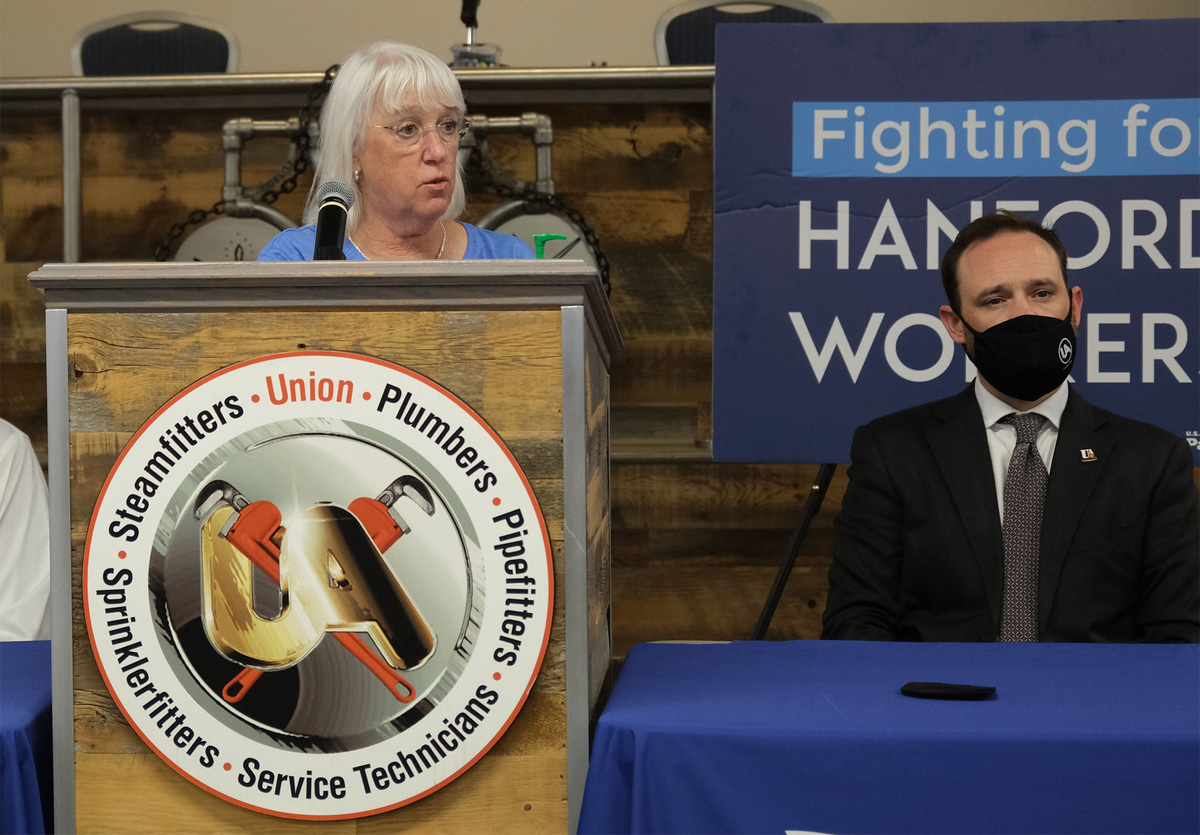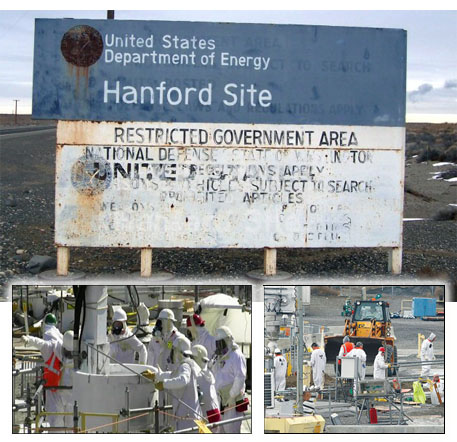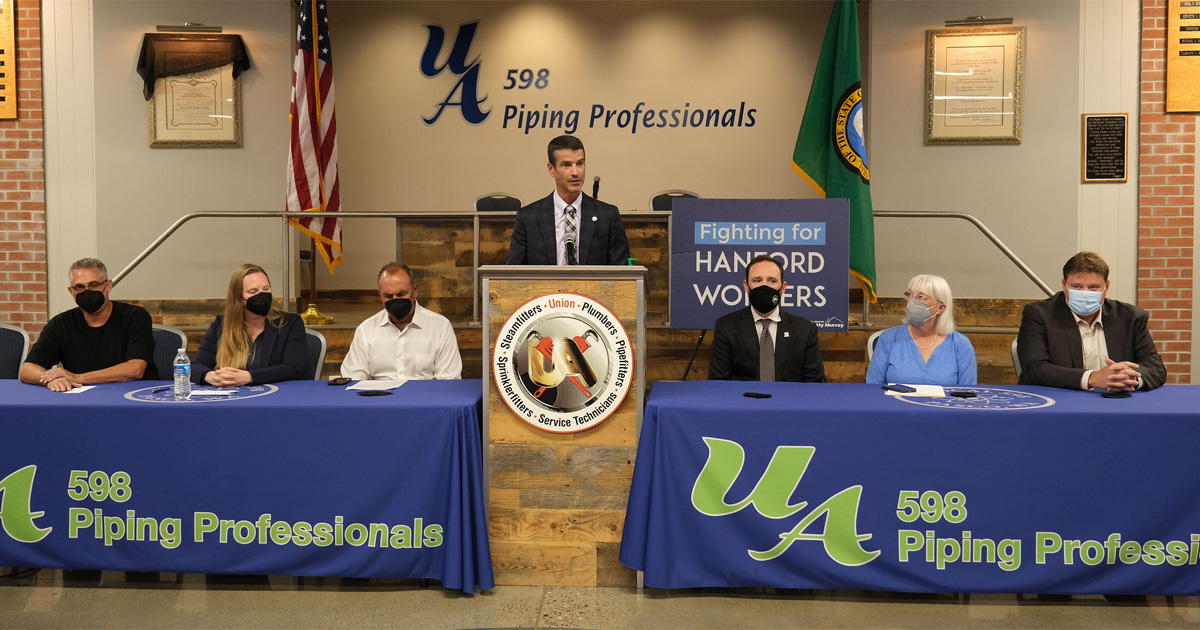NATIONAL
Murray works to help Hanford workers exposed to beryllium
PASCO, Wash. (Aug. 25, 2022) — U.S. Sen. Patty Murray (D-WA) announced new legislation Wednesday that would expand access to benefits for more past and current workers at the Hanford nuclear reservation who are exposed to beryllium but unable to access care due to outdated federal laws that place overly burdensome requirements around proof of illness on workers.
 “The federal government has a legal and moral obligation to the Hanford workers who are doing incredible and important work at Hanford — it’s my job to make sure the administration is living up to that obligation, whether that’s securing federal dollars for the Hanford site or making sure Hanford workers are getting the benefits they have earned,” Murray said. “My new bill will expand access to benefits for sick workers who are not getting the care they need because of a technicality — this is a wrong I am determined to make right. Passing this legislation will save lives and I’ll be working hard to get this done as soon as possible.”
“The federal government has a legal and moral obligation to the Hanford workers who are doing incredible and important work at Hanford — it’s my job to make sure the administration is living up to that obligation, whether that’s securing federal dollars for the Hanford site or making sure Hanford workers are getting the benefits they have earned,” Murray said. “My new bill will expand access to benefits for sick workers who are not getting the care they need because of a technicality — this is a wrong I am determined to make right. Passing this legislation will save lives and I’ll be working hard to get this done as soon as possible.”
Murray announced the legislation Wednesday at a roundtable meeting with Hanford workers and labor leaders at the UA Local 598 hall. She was joined by Nickolas A. Bumpaous, President of the Central Washington Building and Construction Trades Council and the Business Manager for UA Local 598; Steve Maki, Worker Trainer Director at the Volpentest Hazardous Materials Management and Emergency Response (HAMMER) for Central Washington Building Trades; Jeff McDaniels, President of Hanford Atomic Metal Trades Council (HAMTC); Steve Mauri, Worker Trainer Director at HAMMER for HAMTC; and AJ Fouts, Government Affairs Director for UA Local 598.
“Labor unions throughout the state have been working towards this goal of expanded coverage for beryllium exposure. It’s all about ensuring that people make it home from work in the same condition as they went to work,” Bumpaous said. “Hanford is the most contaminated worksite in the western world and the hazards workers face there are uniquely dangerous. We need to do our part to make sure folks have the best safety protocols possible, but when they do have exposure, they must have the support and compensation they and their families need.”
“This legislation is a huge step in the right direction,” he added. “We thank Senator Murray for her leadership on this and we’re calling on all U.S. Senators — Democrats and Republicans alike — to support its passage. This should not be a political issue. This is about supporting American workers who are serving our nation.”
For decades, beryllium was used to cap nuclear rods, including at the Hanford site. Beryllium is a heavy metal, exposure to which can cause “beryllium sensitization” or, in more advanced cases Chronic Beryllium Disease (CBD). CBD leads to scarring on the lungs causing many other respiratory problems, including an increased incidence of lung cancers. Currently, the Department of Labor’s Office of Workers Compensation Programs (OWCP) administers the Energy Employees Occupational Illness Compensation Act (EEOICPA), through which Hanford workers dealing with issues stemming from their exposure to beryllium receive care and benefits.
As the law is currently written, someone must present one abnormal blood test and evidence of a lung disease in order to receive benefits and care for their illness through the EEOICPA. Many workers or former workers, however, receive “borderline” test results for years while symptoms manifest or they never get the “abnormal” result at all. This legislation would amend the EEOICPA to count three “borderline” results as sufficient evidence to receive a diagnosis of beryllium sensitivity. This provision would apply to former, current, and future workers so no one would face unfair barriers to care.
“Workplace exposure to toxic substances for workers is deeply personal to me. My personal experience with beryllium exposure, my background as an advocate and workforce representative, allows me to help minimize exposures for all workers,” said Calin Tebay, worker and health advocate. “This also allows me to help current and former workers, and their families, get access, education, and care they deserve. For nearly 12 years, I have worked with colleagues and medical professionals across the country with a shared goal of creating consistent, accurate, and up to date diagnosis criteria for Beryllium related Disease and Conditions. This would include updating the Department of Labor’s diagnosis criteria for Beryllium Sensitization to ensure workers exposed to this toxic metal, and are diagnosed with this condition, can and will receive care. I strongly support this legislation and appreciate Senator Murray for listening to and working with the Hanford workers, medical experts, and many others and taking on this important issue.”
 Senator Murray has led the fight in Congress to secure funding for the cleanup at the Hanford, protect workers, and support the Tri-Cities communities. Earlier this summer, she secured an unprecedented increase in President Biden’s budget request for Hanford site cleanup, putting that request at $2.613 billion for FY2023.
Senator Murray has led the fight in Congress to secure funding for the cleanup at the Hanford, protect workers, and support the Tri-Cities communities. Earlier this summer, she secured an unprecedented increase in President Biden’s budget request for Hanford site cleanup, putting that request at $2.613 billion for FY2023.
In the FY2022 government funding package, Murray secured $2.595 billion for the Hanford site cleanup — notably, this was $128 million above the President’s Budget Request. As she negotiates funding for the fiscal 2023 budget, Murray is fighting to build on the previous budget’s funding and the increased request by the president will be critical as she seeks to secure the strongest possible funding for the Hanford site cleanup. The President’s revised budget request came only after Murray’s strong urging and public exchanges with Secretary Granholm and OMB Budget Director Shalanda Young.
In March 2021, Murray reintroduced and is currently fighting to pass the Toxic Exposure Safety Act which would make it easier for workers at the Hanford site and other nuclear clean-up sites to receive the full benefits they’re entitled to when suffering from illnesses due to toxic exposure on the job.
The federal gov’t has a legal & moral obligation to the Hanford workers. Today I spoke with Hanford workers & unveiled my new bill to expand access to benefits for sick workers who aren’t getting the care they need & have earned because of a technicality. This is wrong. pic.twitter.com/sX25DNlkcf
— Senator Patty Murray (@PattyMurray) August 24, 2022






